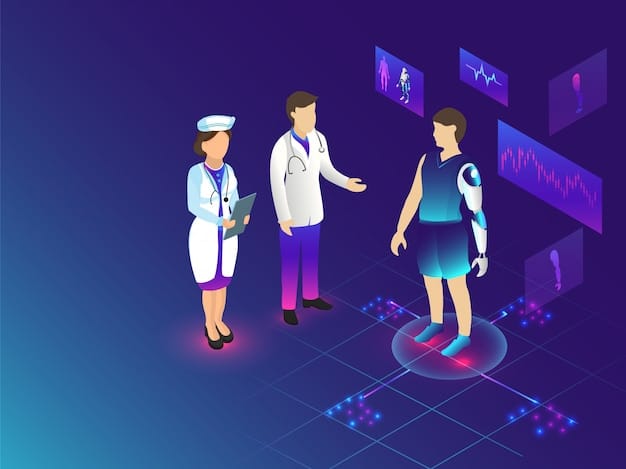The Rise of AI: Revolutionizing Industries in 2025

The accelerating integration of artificial intelligence is fundamentally transforming global industries, redefining operational paradigms and driving unparalleled innovation across sectors by 2025.
The dawn of a new technological era is upon us, marked by the undeniable impact of artificial intelligence. We are witnessing the rise of AI, not as a futuristic fantasy, but as a tangible force reshaping industries, economies, and daily life.
Understanding the AI Evolution: Beyond the Hype
Artificial intelligence, often perceived through the lens of science fiction, has quietly evolved from theoretical concepts to practical applications that underpin much of our modern infrastructure. This evolution is characterized by breakthroughs in machine learning, deep neural networks, and natural language processing, allowing AI systems to perform increasingly complex tasks with remarkable accuracy.
The current landscape of AI is vastly different from its early iterations. What began as rudimentary rule-based systems has transformed into sophisticated, adaptive algorithms capable of learning from vast datasets, identifying patterns, and making autonomous decisions. This rapid progression is fueled by exponential increases in computational power and the availability of massive amounts of data.
From Algorithms to Intelligent Systems
The journey of AI has been marked by several significant milestones, each pushing the boundaries of what machines can achieve. The shift from simple algorithms to intelligent systems capable of nuanced understanding is a testament to decades of relentless research and development.
- Machine Learning Foundation: The bedrock of modern AI, enabling systems to learn from data without explicit programming.
- Deep Learning Revolution: Utilizing multi-layered neural networks to process complex data like images, sound, and text.
- Natural Language Processing (NLP): Allowing machines to understand, interpret, and generate human language.
- Computer Vision Advancements: Equipping AI with the ability to “see” and interpret visual information from the world.
These advancements are not isolated; they often intersect, leading to synergistic effects that amplify the capabilities of AI. For instance, advanced NLP combined with deep learning has given rise to highly intelligent chatbots and translation services that were unimaginable just a few years ago. The ongoing refinement of these core technologies promises even more transformative applications in the near future.
As AI continues its trajectory, its influence extends beyond mere automation. It is becoming an indispensable tool for discovery, problem-solving, and innovation, pushing the boundaries of human capability and thought. Understanding this foundational evolution is crucial to appreciating its profound impact on various sectors.
AI Redefining Healthcare: Precision and Personalization
The healthcare sector is undergoing a profound transformation driven by the intelligent capabilities of AI. From diagnostics to drug discovery and personalized patient care, AI is proving to be a game-changer, promising a future of more precise, efficient, and accessible medical services.
One of the most significant impacts of AI in healthcare is its ability to process and analyze vast quantities of medical data at speeds and scales impossible for humans. This includes patient records, imaging scans, genomic data, and research papers, allowing for more accurate diagnoses and tailored treatment plans.
Enhanced Diagnostics and Treatment
AI algorithms are excelling in interpreting medical images like X-rays, MRIs, and CT scans, often identifying anomalies that might be missed by the human eye. This leads to earlier detection of diseases, significantly improving patient outcomes. The precision offered by AI in diagnostics minimizes errors and ensures the earliest possible intervention.
- Early Disease Detection: AI models analyze medical images for subtle signs of diseases like cancer, often before symptoms appear.
- Personalized Medicine: Tailoring treatments based on an individual’s genetic makeup, lifestyle, and unique health data.
- Predictive Analytics: Identifying patients at high risk for certain conditions, enabling proactive interventions.
- Surgical Robotics: Assisting surgeons with enhanced precision, leading to less invasive procedures and faster recovery times.
Beyond diagnostics, AI is instrumental in developing new drugs and therapies. By simulating drug interactions and predicting their efficacy, AI significantly accelerates the research and development process, reducing the time and cost associated with bringing new medications to market. This capability is vital in addressing global health challenges and emerging pandemics.
The integration of AI in healthcare is not about replacing human professionals but empowering them with advanced tools to make more informed decisions and deliver superior care. It’s about augmenting human intelligence with machine capabilities, creating a synergistic approach to health management and patient well-being.

Transforming Finance: Greater Efficiency and Security
The financial services industry, traditionally known for its conservative nature, is embracing AI with unprecedented enthusiasm. This adoption is driven by the pressing need for greater efficiency, enhanced security, and the ability to manage increasingly complex global markets. AI is allowing financial institutions to navigate these challenges with cutting-edge solutions.
AI’s analytical prowess enables banks and financial firms to detect fraud, manage risk, and personalize customer experiences with a level of sophistication previously unattainable. The sheer volume of transactions and data in finance makes it an ideal domain for AI applications, where patterns and anomalies can be quickly identified.
Fraud Detection and Risk Management
One of the most critical applications of AI in finance is in combating fraud. AI algorithms can analyze transaction data in real-time, identifying suspicious patterns and anomalies that indicate fraudulent activities. This proactive approach significantly reduces financial losses and protects consumers’ assets.
- Real-time Fraud Monitoring: Instantly flagging and preventing fraudulent transactions.
- Credit Risk Assessment: More accurately evaluating loan applicants’ creditworthiness based on diverse data points.
- Algorithmic Trading: Using AI to execute trades at optimal times, based on market sentiment and predictions.
- Regulatory Compliance: Assisting financial institutions in adhering to complex regulatory frameworks, reducing compliance costs and risks.
Beyond fraud, AI is revolutionizing risk management. By predicting market trends, assessing credit risks, and identifying potential vulnerabilities, AI provides financial institutions with the insights needed to make more robust decisions. This foresight helps in mitigating losses and capitalizing on emerging opportunities.
Furthermore, AI-powered chatbots and virtual assistants are enhancing customer service, providing instant support and personalized financial advice. This not only improves customer satisfaction but also frees up human agents to focus on more complex inquiries. The blend of AI efficiency and human oversight is creating a more resilient and customer-centric financial landscape.
AI in Retail: Personalized Experiences and Optimized Operations
The retail industry is leveraging AI to move beyond traditional sales models, focusing instead on creating highly personalized customer experiences and optimizing supply chain operations. In an increasingly competitive landscape, AI provides retailers with the tools to understand consumer behavior deeply and respond dynamically to market demands.
From personalized product recommendations to optimized inventory management, AI is reshaping every facet of retail. It allows businesses to anticipate customer needs, streamline logistics, and deliver a seamless shopping journey, whether online or in brick-and-mortar stores.
Customer Engagement and Supply Chain Efficiency
AI’s ability to analyze vast amounts of customer data, including browsing history, purchase patterns, and demographic information, enables retailers to offer hyper-personalized experiences. This extends beyond simple recommendations to dynamic pricing, customized promotions, and even predictive restocking based on individual preferences.
- Personalized Recommendations: AI-driven engines suggest products tailored to individual customer preferences, boosting sales.
- Demand Forecasting: Predicting future sales with greater accuracy, optimizing inventory levels and reducing waste.
- Chatbots for Customer Service: Providing instant support and answering queries, enhancing customer satisfaction.
- Optimized Supply Chains: AI analyzes logistics data to improve delivery routes, warehouse management, and overall efficiency.
On the operational front, AI dramatically enhances supply chain efficiency. By accurately forecasting demand, retailers can minimize overstocking or understocking, leading to significant cost savings and reduced waste. AI also optimizes warehousing and logistics, ensuring products reach customers faster and more reliably.
The strategic deployment of AI in retail is not just about improving sales; it’s about building stronger customer relationships and creating a more agile, responsive business model. It enables retailers to adapt quickly to changing consumer trends and market conditions, securing a competitive edge in the evolving retail landscape.

AI’s Impact on Manufacturing: Automation and Smart Factories
The manufacturing sector is undergoing a profound transformation with the integration of AI, leading to the emergence of “smart factories.” AI is revolutionizing production processes, from design and quality control to predictive maintenance, driving unprecedented levels of automation, efficiency, and flexibility.
The application of AI in manufacturing is not merely about replacing human labor; it’s about creating interconnected, data-driven systems that can learn, adapt, and optimize production in real-time. This ensures higher quality products, reduced waste, and faster time-to-market.
Predictive Maintenance and Quality Control
One of the most valuable contributions of AI in manufacturing is predictive maintenance. AI algorithms analyze data from sensors embedded in machinery to predict when equipment is likely to fail. This allows for proactive maintenance efforts, preventing costly breakdowns and ensuring continuous production.
- Optimized Production Lines: AI adjusts machinery parameters in real time for peak efficiency and output.
- Visual Inspection for Quality Control: AI-powered cameras detect defects with higher accuracy and speed than human inspectors.
- Robotics and Automation: AI enables robots to perform complex tasks with precision, increasing productivity and safety.
- Supply Chain Synchronization: AI optimizes the flow of materials and components, ensuring just-in-time delivery for manufacturing.
Beyond maintenance, AI is reshaping quality control. AI-powered vision systems can detect even the slightest imperfections in products, ensuring consistent quality across mass production. This level of scrutiny minimizes recalls and enhances brand reputation.
Moreover, AI contributes to the development of more adaptive manufacturing processes. It allows factories to quickly reconfigure production lines to accommodate new product designs or fluctuating demand, offering unparalleled flexibility in response to market changes. The synergy between AI and automation is defining the future of industrial production.
Ethical Considerations and the Future of AI Integration
As the rise of AI continues to accelerate, a crucial dialogue emerges surrounding its ethical implications and the responsible integration into society. While the potential benefits are immense, addressing concerns around privacy, bias, job displacement, and accountability is paramount to ensuring AI serves humanity positively.
Ignoring these ethical dimensions risks undermining public trust and potentially leading to unintended negative consequences. Therefore, conscious efforts must be made to develop AI systems that are fair, transparent, and aligned with human values.
Addressing Bias and Ensuring Transparency
One of the most pressing ethical challenges is algorithmic bias. AI systems learn from the data they are fed, and if that data reflects existing societal biases, the AI will perpetuate and even amplify those biases. This can lead to discriminatory outcomes in areas like hiring, lending, or even criminal justice.
- Data Diversity and Curation: Actively diversifying training data to mitigate inherent biases.
- Explainable AI (XAI): Developing AI models whose decision-making processes are understandable and auditable.
- Privacy Protection: Implementing robust measures to safeguard personal data used by AI systems.
- Job Market Adaptation: Focusing on upskilling and reskilling programs to prepare the workforce for AI-driven changes.
Transparency in AI’s decision-making process, often referred to as Explainable AI (XAI), is vital. Users and developers need to understand why an AI system made a particular decision, especially in high-stakes applications. This fosters trust and enables accountability when errors or unintended outcomes occur.
The future of AI integration hinges on a collaborative approach involving policymakers, technologists, ethicists, and the public. Developing ethical guidelines, robust regulatory frameworks, and fostering responsible innovation are essential steps. The goal is to harness AI’s transformative power while safeguarding societal well-being and ensuring a future where technology serves humanity equitably.
| Key Area | Brief Impact |
|---|---|
| 🏥 Healthcare | Enhanced diagnostics, personalized treatment, accelerated drug discovery. |
| 💰 Finance | Real-time fraud detection, accurate risk assessment, automated trading. |
| 🛍️ Retail | Hyper-personalized shopping experiences, optimized inventory, demand forecasting. |
| ⚙️ Manufacturing | Predictive maintenance, automated quality control, smart factory operations. |
Frequently Asked Questions About AI’s Rise
The rapid advancement of AI is primarily fueled by a convergence of factors: exponential increases in computational power, particularly with GPUs; the availability of vast datasets for training algorithms; and continuous breakthroughs in machine learning and deep learning research. These elements collectively enable more sophisticated and capable AI systems.
Beyond industry-specific applications, AI touches daily life through smart assistants like Siri and Alexa, personalized content recommendations on streaming services, spam filters in email, and even navigation apps. It enhances convenience, entertainment, and communication, making many routine tasks more efficient and tailored to individual needs.
Yes, significant ethical concerns accompany AI’s growth. These include potential job displacement due to automation, issues of algorithmic bias leading to discriminatory outcomes, privacy concerns related to data collection, and the question of accountability when AI systems make errors. Addressing these requires careful policy-making and ethical guidelines.
Businesses can prepare by investing in AI literacy for their workforce, identifying processes that can benefit most from AI automation, and ensuring a robust data infrastructure. Collaborating with AI experts, pilot projects, and focusing on ethical deployment are also crucial steps for successful AI integration.
In an AI-driven future, humans will shift towards roles requiring creativity, critical thinking, emotional intelligence, and complex problem-solving—skills AI struggles with. Humans will also focus on managing, designing, and overseeing AI systems, ensuring ethical use and leveraging AI’s capabilities for innovation and societal benefit, fostering a synergistic relationship.
Conclusion
The undeniable rise of AI marks a pivotal epoch in technological advancement, fundamentally reshaping industries, economies, and profoundly influencing our daily existence. Far from a mere passing trend, AI is a foundational shift, introducing unprecedented efficiencies, innovations, and capabilities across diverse sectors.
From revolutionizing healthcare with personalized treatments to fortifying financial systems against fraud, optimizing retail experiences, and transforming manufacturing processes, AI’s omnipresent impact is both profound and multifaceted. Yet, this transformative journey is not without its complexities, necessitating a diligent focus on ethical considerations, including addressing biases, ensuring transparency, and managing societal impacts like job market evolution. The future of AI is undeniably intertwined with human collaboration, requiring continuous adaptation, responsible governance, and a commitment to harnessing its power for collective good. As we embrace this AI-driven future, our collective foresight and ethical stewardship will determine its ultimate trajectory and benefits for all.





